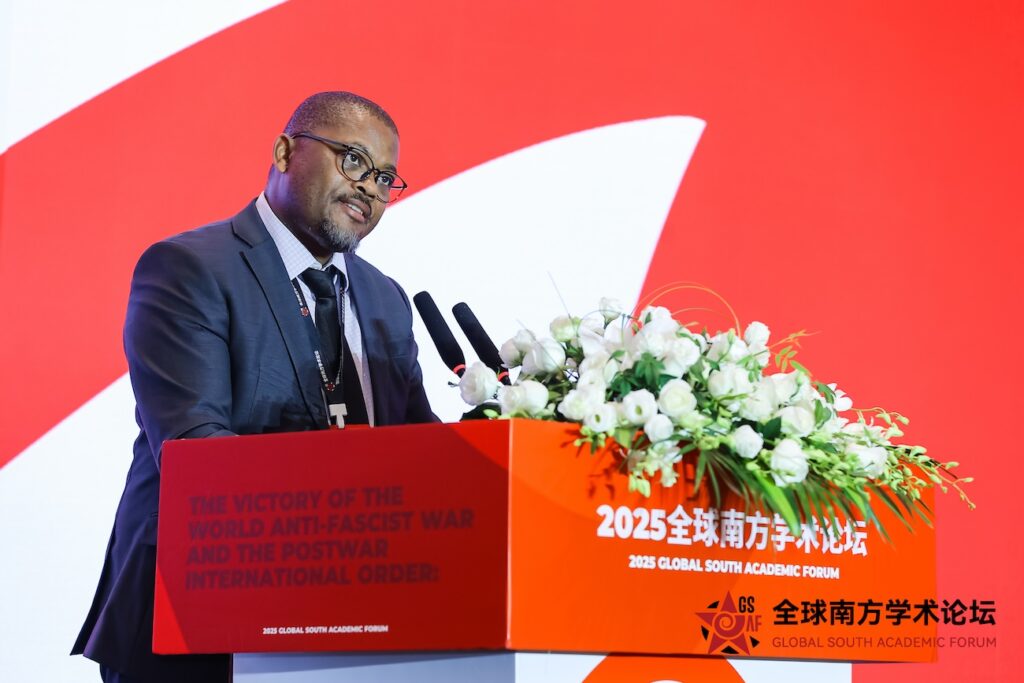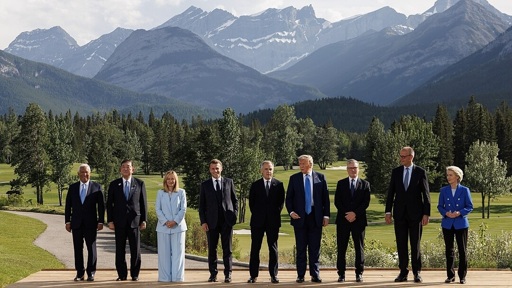This article is based on a keynote speech delivered by South African scholar Busani Ngcaweni at the 2025 Global South Academic Forum “The Victory of the World Anti-Fascist War and the Postwar International Order: Past and Future”. The contents of the speech were lightly edited for clarity and length.
Mainstream media would make us believe that fascism ended in the twentieth century. It clings to the illusion that the fascist imagination died with the dictators who wore uniforms and medals. It comforts itself with the myth that the age of goose steps and concentration camps has passed into history.
Yet the theme of this conference calls us to look beneath contemporary global governance systems and examine the nature of power in transition. It invites us to ask what becomes of humanity when global order is confused with global obedience. It directs us to explore the moral foundations of domination that remain unchanged despite the emergence of new vocabularies.
Fascism did not vanish. It refined itself. It removed its militaristic costume and adopted new languages and institutions. Its imperial ambitions survived, hidden beneath the fabrics of civility and coated in the rhetoric of progress and development.
What we confront today is not the afterlife of fascism but its metamorphosis. It is fascism without spectacle, clothed in diplomacy, policy and market orthodoxy. It calls itself good governance and international order. It hides behind rating agencies, consulting firms or the Big Con, as Mariana Mazzucato calls them, and think tanks. It speaks of stability yet cultivates instability for profit, as we have seen in Congo DRC. It builds consensus by saturating the world with the idea that there is no alternative to Western universalism.
It no longer shouts. It administers. It no longer burns books. It shapes algorithms and commits epistemic violence. It no longer stages parades. It stages wars of humanitarian necessity. It wages violence through law, bureaucracy and debt. In this form, it appears rational, even inevitable and therefore more dangerous than its earlier expression.
This logic extends into culture, now aided by large language models. As colonial officials once codified African culture and languages to discipline communities, so too do the platforms of Silicon Valley flatten our speech into big data points. They claim neutrality yet carry the same impulse to command meaning. I have argued before that these digital tools rewrite our idioms into monotones and turn flames into ashes. They repeat, in a more sophisticated form, the colonial act of stripping knowledge systems of their sovereignty.
This is the fascism of our age: hegemonic statecraft.

South African scholar Busani Ngcaweni speaking at the 2025 GSAF. Photo: GSAF
Classical fascism was visible. We saw it in Germany, Italy, Chile, Japan and South Africa. It worshipped the state as destiny. It demanded purity and submission. It glorified force and obedience. It punished dissent and crushed the vulnerable. If we borrow from Ray Charles, it kicked the man who had to crawl; heaven help us all.
Hegemonic statecraft looks polite. It hosts summits and speaks of democracy and development. Yet beneath the polite texture lies the same metaphysical impulse: the desire to dominate, regulate and reorder the world in the Euro-American image.
Since the end of the Second World War, the global order has been structured around the jaundiced morality of a few. Western powers used the language of liberalism to discipline others and the architecture of multilateralism to preserve asymmetry; their statecraft functions as domination rather than solidarity.
It enforces influence through sanctions, debt, aid, media and military intervention. It controls knowledge through patents and propaganda. It celebrates open markets while kicking away the developmental ladder for the South.
This tradition has deep roots in imperial classification systems. As the Latin American decolonial scholar Ramón Grosfoguel writes:
“We moved from the sixteenth-century characterization of people without writing, to the eighteenth and nineteenth-century labeling of people without history, to the twentieth-century invention of people without development, and now to the early twenty-first-century narrative of people without democracy.”
We are always without, needing meaning from others.
This is the long grammar of dismembering. It strips whole societies of voice and legitimacy so that domination can appear as upliftment.
Hegemonic statecraft governs through manufactured consent. It convinces the oppressed to internalize their oppression. It teaches them that poverty is self-inflicted, that inequality is natural, and that resistance is irrational. In doing so, it empties the imagination of alternatives.
Its brilliance lies in its invisibility.
Fascism is not only political violence. It is metaphysical violence. It worships a false universality while rejecting a shared humanity. It draws borders on maps and also in minds. It ranks people by degrees of being. It names itself civilization and names others a threat.
Colonialism, apartheid, Zionism and fascism belong to one genealogy. They are methods of world-making through erasure. They manufacture emptiness to justify occupation. They rename destroyed lands as proof that nothing existed before.
The global order governed by hegemonic statecraft continues this lineage. It renames domination as humanitarian intervention, innovation or modernization. It treats sovereignty as a privilege rather than a right. It measures worth in currency instead of dignity. It divides humanity into capable and incapable, civilized and fragile.
Its invasions are labeled peacekeeping. Its extraction is called partnership. Its destruction is narrated as reform.
It cannot coexist with plurality. It tolerates differences only when differences are obedient. It dismembers nations and reconstructs them as protectorates or markets. It intervenes not to end suffering but to secure alignment. It rebuilds not to restore peace but to create dependency.
Today, the world is at war, often in an invisible manner. Sanctions starve more effectively than bombs. Debt destroys more thoroughly than fire. Data surveillance penetrates more deeply than armies. Trade barriers suffocate small economies. The moral violence of fascism has become routine and administrative. It is the DNA of modern capitalism.
Ladies and gentlemen, one cannot talk about fascism without referring to the atrocities being committed against the people of Palestine.
To speak of Palestine is to talk about the language of global power. Palestine is not only a theater of occupation. It is the archetype of dismemberment.
To dismember a people is to sever them from the symbolic order that affirms their existence. It is to deny them the right to name themselves, remember themselves and imagine themselves. Israel’s project rests upon this metaphysical violence. It seeks not only to occupy geography but to erase ontology.
It claims there are no Palestinians, only inhabitants. It treats memory as an inconvenience. To erase the name is to erase the possibility of the future.
Dismembering operates territorially through fragmented land, historically through claims of non-existence and epistemically through controlled narratives that rename occupation as conflict.
Palestine reveals something else that is vital for our analysis. It shows how the powerful monopolize the language of morality itself. They define violence by who performs it, not by who suffers from it. They define terror by who names it, not by who endures it. In this way, imperialism controls not only borders but also the meaning of justice. Palestine is the mirror in which the Global South recognizes the structure of its own dispossession. It is the place where the world learns how far a system will go to preserve its racialized order. Which is why President Nelson Mandela said, South Africa’s freedom was incomplete without the liberation of Palestine.
Fascism is not dead. It has become efficient. It manufactures consent. It convinces people that inequality is natural and that poverty is a deserved consequence. It worships the market as the god of order. The body is not imprisoned. It is indebted. The mind is not censored. It is distracted. Information circulates, yet meaning is monopolized.
Beyond the Middle East, fascism today is digital. Its concentration camps are invisible. Its violence is inscribed in code and contract. In the linguistic sphere, it strips African languages of their elasticity. It rewrites them for foreign ears. It polices what it claims to correct. This is the newest frontier of epistemicide. It is colonialism translated into an algorithm.
Hegemonic statecraft disciplines nations through ratings, debt, sanctions, and structural reforms. It enforces dependency under the banner of globalization. Domination appears as cooperation, and inequality as efficiency. This is the perfection of fascism: control without invasion and erasure without noise.
If hegemonic statecraft dis-members, developmental statecraft re-members through solidarity.
At Bandung in 1955, the leaders of Asia and Africa declared that nations have the right to develop in their own way. Bandung was not simply a meeting. It was a moral proclamation. It affirmed that freedom is not charity and that civilisation is not Western property.
Solidarity is not sentiment. It is structured. It affirms that no nation can be free while another is colonized and no humanity can be whole while any of its limbs remain severed.
Today, echoes of Bandung are visible in the Global South’s initiatives, such as China’s Global Development Initiative, which promotes shared prosperity. The Global Security Initiative emphasizes the principle of indivisible security. The Global Civilization Initiative celebrates cultural plurality. The Global Governance Initiative calls for institutions that reflect fairness rather than force.
These initiatives reject unipolar arrogance. They sketch a moral geography first drawn at Bandung. This is developmental statecraft in action.
Developmental statecraft is not a policy model. It is a philosophy of being. It proposes that the state in the Global South must be a moral and communicative agent. It must rebuild meaning not only in institutions, but also in individuals.
The post-colonial world inherited states without sovereignty and governments without power. Developmental statecraft recognizes this rupture. It rebuilds voice and restores agency.
The crisis of the South is not only economic. It is epistemic and communicative. We were conquered not only by armies but by narratives. Hence, my argument is that our languages must be defended in code, in corpora, in journals, and in the classroom. Sovereignty is spoken. It is coded. It is narrated.
Here we must recall the intellectual lineage that shaped our struggle. Frantz Fanon taught that decolonization is a program of total disordering of colonial meaning. Samir Amin insisted that peripheral nations cannot develop within structures designed to keep them subordinate. Archie Mafeje reminded us that anthropology itself became a weapon against our people. Developmental statecraft inherits this tradition. It insists that the state must become an active shaper of public value, not a passive administrator of imported doctrine. It must guide markets, mobilize society and rebuild knowledge systems that colonialism sought to extinguish.
The developmental state must become a pedagogical state that listens before it instructs. Communication is the essence of legitimacy. Power is only just when it is intelligible, and authority is only moral when it listens.
Re-membering transforms survival into agency. It turns memory into movement. It restores humanity as the center of politics.
Hegemonic statecraft is the moral continuation of fascism. Developmental statecraft is the re-membering of that which fascism dis-membered.
Let us go forth and hold high the banner of solidarity.
Busani Ngcaweni is the director of the Center for Public Policy and African Studies at the University of Johannesburg.
The post Hegemonic statecraft as contemporary fascism: dis-membering the world to govern it appeared first on Peoples Dispatch.
From Peoples Dispatch via this RSS feed


